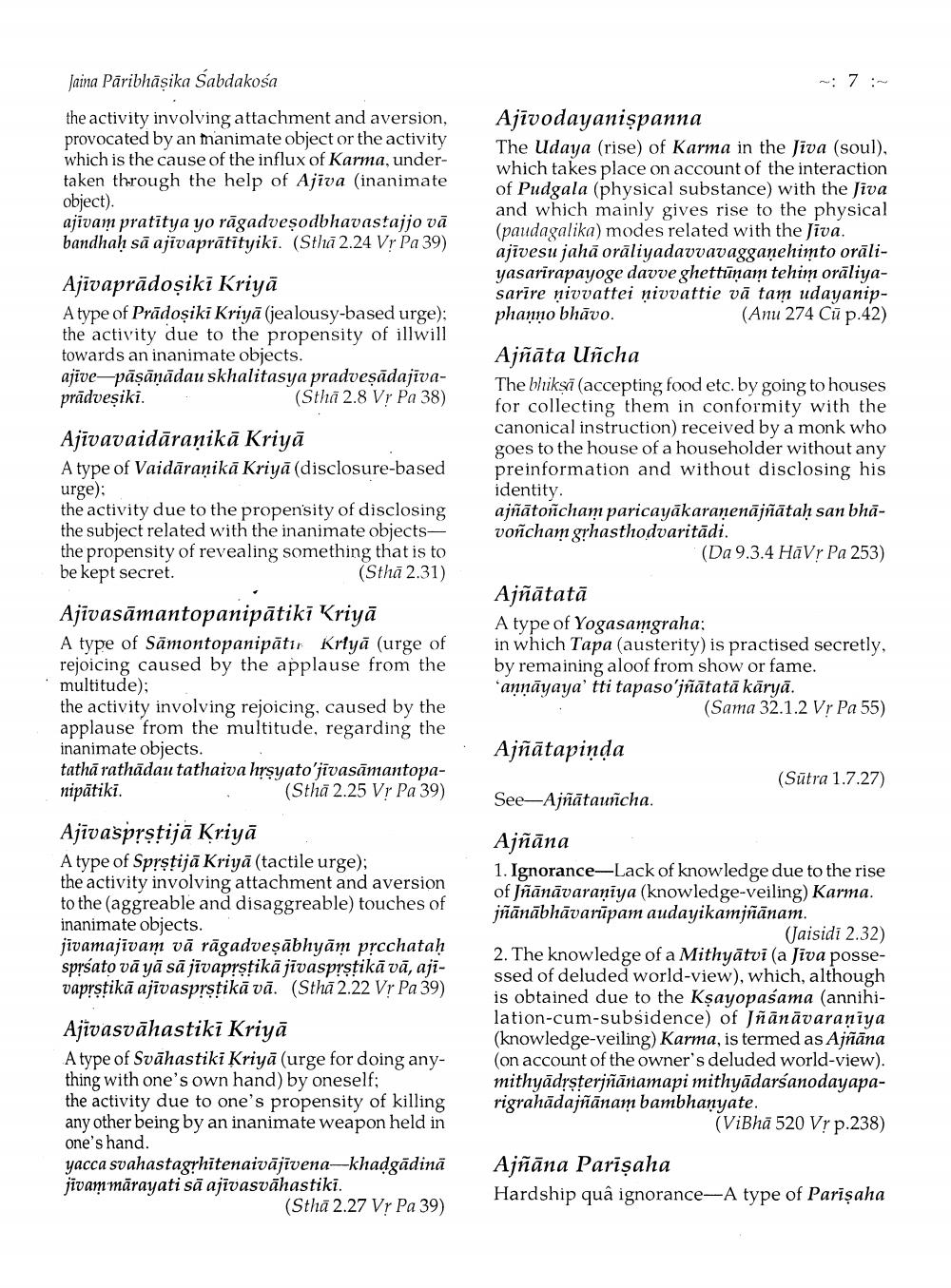________________
Jaina Pāribhāsika Sabdakosa the activity involving attachment and aversion, provocated by an manimate object or the activity which is the cause of the influx of Karma, undertaken through the help of Ajiva (inanimate object) ajivam pratitya yo rāgadveşodbhavastajjo vā bandhaḥ sā ajivaprātityiki. (Sthā 2.24 Vr Pa 39)
Ajīvodayanişpanna The Udaya (rise) of Karma in the Jiva (soul), which takes place on account of the interaction of Pudgala (physical substance) with the Jiva and which mainly gives rise to the physical (paudagalika) modes related with the Jiva. ajīvesu jahā orāliyadavvavaggaņehimto orāliyasarirapayoge davve ghettünam tehim orāliyasarire nivvattei nivvattie vā tam udayanipphanno bhāvo.
(Anu 274 Cū p.42)
Ajīvaprādoșiki Kriyā A type of Prādoșiki Kriyā (jealousy-based urge); the activity due to the propensity of illwill towards an inanimate objects. ajive-pāşāņādau skhalitasya pradveşādajivaprādveșiki.
(Sthā 2.8 Vr Pa 38)
Ajñāta Uncha The bliksī (accepting food etc. by going to houses for collecting them in conformity with the canonical instruction) received by a monk who goes to the house of a householder without any preinformation and without disclosing his identity. ajñātoñcham paricayākaranenājñātaḥ san bhāvoñcham gļhasthodvaritādi.
(Da 9.3.4 HÔVr Pa 253)
Ajīvavaidāraṇikā Kriyā A type of Vaidāraṇikā Kriyā (disclosure-based urge): the activity due to the propensity of disclosing the subject related with the inanimate objectsthe propensity of revealing something that is to be kept secret.
(Sthā 2.31) Ajivasāmantopanipātiki Kriyā A type of Sāmontopanipätır Krlyā (urge of rejoicing caused by the applause from the multitude); the activity involving rejoicing, caused by the applause from the multitude, regarding the inanimate objects. tathā rathādau tathaiva hrsyato'jivasāmantopanipātiki.
(Sthā 2.25 Vr Pa 39)
Ajñātatā A type of Yogasamgraha; in which Tapa (austerity) is practised secretly, by remaining aloof from show or fame. 'annāyaya' tti tapaso'jñātatā kāryā.
(Sama 32.1.2 Vr Pa 55)
Ajñātapinda
(Sutra 1.7.27)
See-Ajñātauñcha.
Ajīvasprstijā Kriyā A type of Sprstijā Kriyā (tactile urge); the activity involving attachment and aversion to the (aggreable and disaggreable) touches of inanimate objects. jivamajivam vā rāgadveşābhyām prcchataḥ sprsato vā yā sā jīvaprstikā jīvasprstikā vā, ajivaprstikā ajivasprstikā vā. (Sthā 2.22 Vr Pa 39)
Ajñāna 1. Ignorance-Lack of knowledge due to the rise of Jñānāvaraniya (knowledge-veiling) Karma. jñānābhāvarūpam audayikamjñānam.
(Jaisidi 2.32) 2. The knowledge of a Mithyātvi (a Jiva possessed of deluded world-view), which, although is obtained due to the Kşayopasama (annihilation-cum-subsidence) of Jñānāvaraniya (knowledge-veiling) Karma, is termed as Ajñāna (on account of the owner's deluded world-view). mithyādrsterjñānamapi mithyādarśanodayaparigrahādajñānam bambhanyate.
(ViBhā 520 Vr p.238)
Ajivasvāhastiki Kriyā A type of Svāhastiki Kriyā (urge for doing anything with one's own hand) by oneself; the activity due to one's propensity of killing any other being by an inanimate weapon held in one's hand. yacca svahastagrhitenaivājīvena-khadgādina jivam mārayati sä ajivasvāhastiki.
(Sthā 2.27 Vr Pa 39)
Ajñāna Parişaha Hardship quâ ignorance-A type of Parişaha




